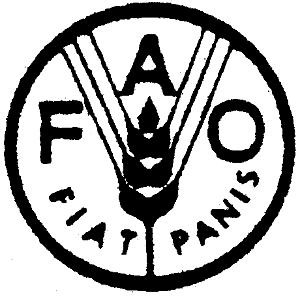
EPR/81/28
September 1981
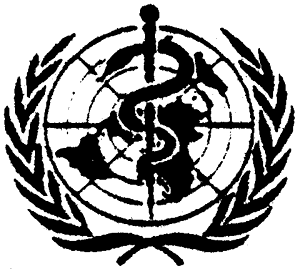

 | FOOD AND AGRICULTURE ORGANIZATION OF THE UNITED NATIONS | ESN: FAO/WHO/UNU EPR/81/28 September 1981 |
 | WORLD HEALTH ORGANIZATION | |
 | THE UNITED NATIONS UNIVERSITY |
Item 3.2.2 of the Provisional Agenda
Joint FAO/WHO/UNU Expert Consultation on Energy and Protein Requirements
Rome, 5 to 17 October 1981
INTERACTION OF ENERGY AND PROTEIN INTAKES IN RELATION
TO
DIETARY REQUIREMENTS
by
Benjamin Torún and Vernon R. Young
INCAP, Guatemala
and
MIT, Cambridge
USA
The intake of dietary energy influences the needs for protein and viceversa. This reciprocal relationship is complicated by the changes induced by one nutrient on the metabolism of the other and also by the different criteria that must be used to recommend dietary intakes of either nutrient. For example, protein recommendations are intended to satisfy the needs of almost all individuals in a population group. Therefore, they include a margin of safety above the mean requirement for that population. In contrast to this, energy recommendations are intended to meet the average needs of the population group, as dietary energy intake in excess of individual physiological needs leads to obesity.
The physiological and practical implications of the interaction between energy intake and protein metabolism and between protein intake and energy metabolism must then be considered when the dietary requirements for either nutrient is assessed.
ENERGY INTAKE AND NITROGEN BALANCE
This aspect of protein-energy interaction is important since most of the investigations that led to the present estimates of protein requirements are based on nitrogen balance studies. I t has long been recognized that the metabolism of protein is influenced by the level of energy intake (Forbes et al., 1939; Munro, 1951). The most notorious effect of this dependence has been on the changes in urinary nitrogen excretion and its influence on the sign and magnitude of the nitrogen balance. If the diet supplies enough energy to meet physiological needs, protein intake determines N balance. Conversely, if the diet provides enough nitrogen and essential amino acids, energy intake can determine N balance. It is generally accepted that there is a limit to these reciprocal influences, such that if the diet does not provide adequate amounts of protein nor of energy, additional intakes of either nutrient allows no further improvement of N balance beyond a given value (Calloway and Spector, 1954; Inoue et al., 1973).
It has been proposed that the decrease in nitrogen balance which accompanies a reduction in energy intake can be explained on the basis that satisfaction of energy demands has pre-eminence over that of protein. Consequently, part of the dietary proteins -and also possibly part of the body proteins- are used as energy substrates with a resultant increase in the urinary excretion of nitrogen derived from the amine moiety of the amino acids.A similar argument may be used for the effect of a high energy intake on nitrogen balance: although fats and carbohydrates are the body's preferred energy fuels, protein breakdown is also a source of energy. A surplus of dietary energy in the presence of adequate or excess protein intakes might spare some of the protein normally used for energy production. This could improve nitrogen retention, within certain limits. Whatever the mechanism for these phenomena, it has been shown that a high energy intake will reduce urinary nitrogen losses of men fed protein near or below the requirement level (Calloway, 1975; Garza et al., 1976; Kishi et al., 1978; Iyengar and Narasinga Rao, 1979).
This has important practical implications, since the protein requirement is conventionally defined as the amount needed when the requirements for energy and other nutrients are fully met. Therefore, to be on the safe side, many investigations about protein requirements based on nitrogen balance studies have provided liberal energy intakes which permitted some weight gain in adults and greater-than-normal weight gains in children.
If results obtained under such conditions are applied to people whose habitual energy intakes are rather low, protein requirements may be underestimated. One may speculate, however, that such underestimation might be compensated by adaptive mechanisms that allow a more efficient utilization of dietary energy and/or protein when the intakes of those nutrients are marginal.
The changes in nitrogen balance related to dietary energy led to the belief that N balance might be a more sensitive and immediate indicator of the adequacy of energy intake than changes in body weight (FAO/WHO, 1978). This possibility was based on studies such as that illustrated in Figure 1, showing that when protein was fed at a fixed level and dietary energy was modified, there was a positive correlation between energy intake and nitrogen balance. Other studies, however, have not shown a correlation. For example, in an investigation carried out at INCAP (Torún and Viteri, 1981), preschool children ate protein in amounts slightly higher than the “safe level” recommended by FAO/WHO (1973) and their energy intake was reduced at 40-day intervals. Figure 2 shows that nitrogen retention measured on days 17–20 and 37–40 of each energy level did not change, although the reduction in energy intake was accompanied by a decrease in energy expenditure and, at a latter stage, by an arrest in weight gain. It may be that the 40-day duration of the dietary periods and the decrease in energy expenditure albeit without noticeable changes in physical activity, allowed for better adaptation to the lower energy intakes and prevented the nitrogen loss. In contrast, most of the studies that have shown a relationship between changes in energy and N balance involved shorter dietary periods (7–14 days) and energy expenditure apparently did not change. These discrepancies could also be related to the level of protein intake: most of the studies where higher energy intakes increased N retention were done with marginal protein intakes, whereas the children studied by Torún and Viteri ate generous amounts of protein, as shown by N retentions greater than those required for growth (FAO/WHO, 1973). It seems that N balance is more sensitive to changes in dietary energy when protein intake is relatively low or that the nitrogen-sparing effect of energy is overshadowed when protein intake surpasses certain limit. This is supported by studies of Iyengar and Narasinga Rao (1979), who showed that an increase in dietary energy improved the N retention of men when they were fed 1.0 but not when fed 1.2 g protein/kg/day, using a mixed diet of predominantly vegetable origin.
All these observations support the conclusion that satisfactory nitrogen balance is a necessary criterion, but not a sufficient one, of the adequacy of dietary energy supply (FAO, 1980).
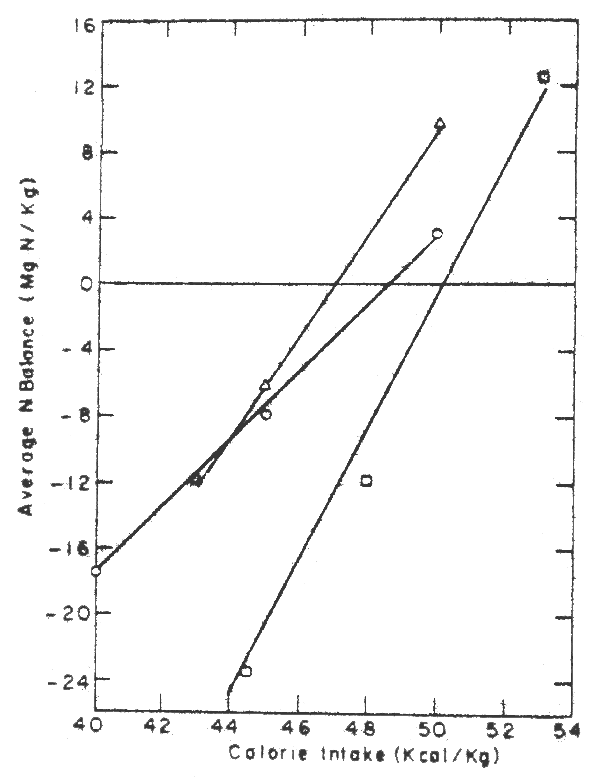
FIGURE 1: Increase in nitrogen retention as dietary energy was increased in 3 young adult men fed 0.57 g egg protein/kg/day (Garza et al., 1976).
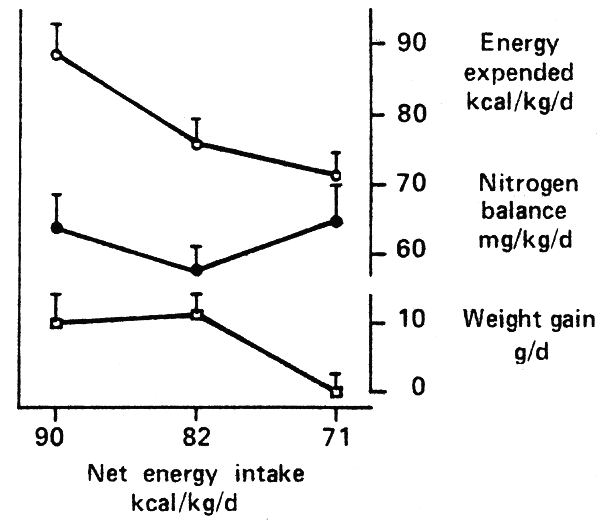
FIGURE 2: Energy expenditure, N balance and weight gain (mean + standard error) of children fed 1.73 g/kg/day of corn and bean proteins (58:42) with changes in energy intake at 40-day intervals (From Torún & Viteri, 1981).
ENERGY INTAKE AND RATES OF PROTEIN AND AMINO ACID METABOLISM
Glycine enriched with N-15 was used to measure whole body protein metabolism in children who were fed different amounts of food while recovering from protein-energy malnutrition (Golden et al., 1977).A positive correlation was found between food intake and body protein turnover and synthesis. The investigators expressed the changes in food intake in terms of varying dietary energy intakes, based on the fact that other experiments (Picou and Taylor-Roberts, 1969) did not show an effect of dietary protein alteration on the rate of body protein turnover. However, it is not absolutely certain whether the effects reported by Golden and co-workers were due only to the changes in energy intake or to changes in both energy and protein intakes. Recent studies with a small number of children during and after recovery from severe malnutrition were carried out by Jackson (UNU/IUNS/FAO workshop on protein and energy requirements in developing countries, Berkeley, 1981), who used the same methods as Golden et al.The results suggest that when energy intake was decreased and protein intake was held constant there were increments in the rates of protein turnover, affecting both synthesis and breakdown.Further investigations are required to clarify this aspect of protein-energy interactions.
Young and co-workers (Motil et al., 1981; Young and Bier, 1981) have further explored the effects of energy intake on protein metabolism through studies on whole body amino acid kinetics, using a constant isotope infusion method of whole body amino acid metabolism and the model developed by Picou and Taylor-Roberts (1969).Dynamic aspects of whole body leucine metabolism were explored in 12 young men fed 0.6 g egg protein/kg/day and either a maintenance level of energy or an excess of 25% above maintenance needs. In the fed state the rate of leucine oxidation tended to be lower with the generous energy intake. Nitrogen balance and net leucine retention (ie, leucine incorporation into proteins minus leucine liberated by protein breakdown) were higher when dietary energy exceeded maintenance needs. These findings emphasize the oxidation of essential amino acids and the changes in whole body protein turnover when dietary energy is varied within the surfeit range of intake, at least with maintenance levels of dietary protein intake.
PROTEIN INTAKE AND ENERGY METABOLISM
The influence of protein intake on energy metabolism has long been recognized in animal husbandry and it is known that animals fed isoenergetic amounts of different diets do not necessarily gain equal weight. Studies with experimental animals have also shown that the efficiency of energy utilization is related to the overall nutrient composition of the diet (Kleiber, 1945). Miller and Payne (1962) showed that baby pigs fed a diet with only 2% of protein-calories ate 5 times as much food as their counterparts fed 24% protein-calories, in order to maintain weight.
A limited number of studies in humans have looked into the effects of protein intake on energy metabolism, and the latter has been considered mainly in terms of changes in body weight. The claims for beneficial effects of dietary proteins on athletic performance as an indicator of energy metabolism are mostly anecdotal and usually do not take into account psychological influences and other factors that might affect performance.
Miller and Mumford (1967) conducted a series of experiments on 10 women and 6 men, 20 to 40 years old, who for periods of 4 to 8 weeks were fed diets providing about 1,400 kcal above their normal daily intake and which contained either about 3% or 15% of protein-calories. The mean weight gain of the low-protein group was 1.1 kg, compared with 3.7 kg for the high-protein group. The use of pedometers indicated that physical activity in both groups was low and unchanged, food digestibility was normal and there were no changes in body composition assessed by measurements of total body potassium, urinary creatinine excretion, body water and subcutaneous skinfold thicknesses. Based on their energy intakes and expenditures, the experimental subjects were expected to gain about 5 kg of body weight. The discrepancy between this figure and the actual gains was explained by the investigators as due to increased heat production (Miller et al., 1967) but the different thermogenic effects of the low- and high-protein intakes were not analyzed.
The effects of protein intake on weight gain were confirmed in a study designed to assess the effects of isometric exercises on protein requirements of young men (Torún et al., 1977). Two levels of dietary protein were fed (0.5 and 1 g egg protein/kg/day) under isoenergetic conditions. Energy intake was fed based on each man's dietary history. Physical activity was determined to be constant through daily exercise programs, the use of pedometers and daily interviews about activity patterns. Four men underwent a cross-over study: two were fed the low-protein diet for 5-7 weeks and then received the high-protein diet for 4 weeks, and two other men underwent the opposite procedure. Figure 3 shows that weight gains were larger with the high-protein diet. The men also showed changes in total body potassium which paralleled the changes in the rates of weight gain. These findings indicate that the level of dietary protein influenced the efficiency of dietary energy utilization.
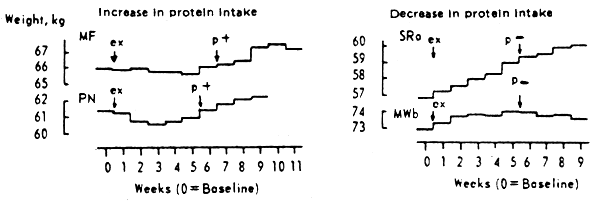
FIGURE 3: Changes in rates of weight gain of men who ate isoenergetic diets with either 0.5 or 1 g egg protein/kg/ day.P+ indicates doubling and P- halving the dietary protein; ex indicates the beginning of an isometric exercise program (From Torún et al., 1977).
There is evidence that dietary protein can also influence the rate of weight gain of infants and young children. MacLean and Graham (1979) evaluated the effects of protein quantity and quality in a retrospective analysis of their studies with children recovering from protein-energy malnutrition. They compared the rates of weight gain of 6 children aged 5 to 17 months who were fed in a randomized way with four isoenergetic diets which provided 125 or 150 kcal/kg/day and from 4 to 8% of milk protein-calories. Each diet was fed to the children for 14 days. Weight gain was significantly lower with the diet that had the lowest protein density. When the protein-calories increased from 5.3 to 6.4%, four of the six children gained weight at a further higher rate. No more changes were observed in the rates of weight gain with additional increments in protein density.
MacLean and Graham (1979) also analyzed the data of another study to evaluate the effect of dietary protein quality on the rates of weight gain of 5 infants aged 3 to 8 months. The infants were fed a casein diet for 9 days and after that they ate isoenergetic-isonitrogenous diets in which wheat provided all dietary protein, either by itself or enriched with 0.12, 0.2 or 0.4% lysine. The dietary periods for wheat lasted 15 to 36 days each and they were given to the children in a random fashion. The mean rate of weight gain was lowest with non-enriched wheat, it improved with the addition of lysine and there were no differences between casein and wheat with 0.4% lysine.
In sum, the amount of bioavailable protein provided by the diet influences the utilization of dietary energy, at least in terms of weight gain. This is similar to the effects known in animal husbandry about the role played by dietary protein in the efficiency of food -or rather, of dietary energy- utilization. Further research is needed to establish whether protein intake affects other aspects of energy metabolism.
SUMMARY AND CONCLUSIONS
In this brief review we have discussed the influence of energy and protein intakes on protein and energy metabolism, respectively. Examples were drawn from scientific publications to illustrate the intimate relationship of these two major nutrients. The discrepancy in the results of studies on energy intake and nitrogen balance were pointed out and explanations for the apparent contradictions were offered. Comments were made on the sparsity of experimental evidence in humans about the effects of energy intake on aspects of protein metabolism, other than nitrogen balance, and about the influence of protein intake on energy metabolism. Studies on the latter, although scanty, deal mainly with changes in body weight. Since the reciprocal interactions may affect the dietary requirement for one of the two nutrients depending on the intake of the other and since there is still much to be learned about the efficiency of their utilization and other metabolic aspects, the importance and needs for further investigations has been emphasized.
Calloway D (1975). Nitrogen balance of men with marginal intakes of protein and energy. J Nutr 105: 914.
Calloway DH, Spector H (1954). Nitrogen balance as related to calorie and protein intake in active young men. Am J Clin Nutr 2: 405.
FAO (1980). Report on the Informal Gathering of Investigators to Review the Collaborative Research Programme on Protein Requirements and Energy Intake. Document ESN/ MISC/80/3, Rome: FAO.
FAO/WHO (1973).Energy and Protein Requirements. Report of a Joint FAO/WHO Ad Hoc Expert Committee. WHO Tech. Rep. 522, Geneva: WHO, and FAO Nutr Meetings Rep 52, Rome: FAO.
FAO/WHO (1978). Report on the First Joint FAO/WHO Expert Consultation on Energy Intake and Protein Requirements. Document TF/INT 297 (DEN), Rome: FAO.
Forbes EB, Bratzler JW, Thacker EJ, Marcy LF (1939). Dynamic effects and net energy values of protein, carbohydrate and fat. J Nutr 18:57.
Garza C, Scrimshaw NS, Young VR (1976). Human protein requirements: the effect of variations in energy intake within the maintenance range. Am J Clin Nutr 29: 280.
Golden M, Waterlow JC, Picou D (1977). The relationship between dietary intake, weight change, nitrogen balance and protein turnover in man. Am J Clin Nutr 30: 1345.
Inoue G, Fujita Y, Niiyama Y (1973).Studies on protein requirements of young men fed egg protein and rice protein with excess and maintenance energy intakes. J Nutr 103: 1673.
Iyengar A, Narasinga Rao BS (1979).Effect of varying energy and protein intake on nitrogen balance in adults engaged in heavy manual labour. Br J Nutr 41: 19
Kishi K, Miyatani S, Inoue G (1978).Requirement and utilization of egg protein by Japanese young men with marginal intakes of energy. J Nutr 108: 658.
Kleiber M (1945). Dietary deficiencies and energy metabolism Nutr Abstr Rev 15: 207.
MacLean, Jr, WC, Graham GG (1979). The effect of level of protein intake in isoenergetic diets on energy utilization. Am J Clin Nutr 32: 1381.
Miller DS, Mumford P (1967). Gluttony: I. An experimental study of overeating low- or high-protein diets. Am J Clin Nutr 20: 1212.
Miller DS, Mumford P, Stock MJ (1967). Gluttony: 2. Thermogenesis in overeating man.Am J Clin Nutr 20: 1223.
Miller DS, Payne PR (1962). Weight maintenance and food intake. J Nutr 78: 1.
Motil KJ, Bier DM, Matthews DE, Burke JF, Young VR (1981). Whole body leucine and lysine metabolism studied with (1-13C) -leucine and (α -15N) -lysine: Response in healthy young men given excess energy intakes. Metabolism 30: 783.
Munro HN (1951). Carbohydrate and fat as factors in protein utilization and metabolism. Physiol Rev 31: 449.
Picou D, Taylor-Roberts T (1969). The measurement of total protein synthesis and catabolism and nitrogen turnover in infants in different nutritional states and receiving different amounts of dietary protein. Clin Sci 36: 283.
Torún B, Scrimshaw NS, Young VR (1977). Effect of isometric exercises on body potassium and dietary protein requirements of young men. Am J Clin Nutr 30: 1983.
Torún B, Viteri FE (1981). Energy requirements of pre-school children and effects of varying energy intakes on protein metabolism. In: Torún B, Young VR, Rand WM (eds): “Protein-Energy Requirements of Developing Countries: Evaluation of New Data”, Tokyo: United Nations Univ Food Nutr Bull suppl 5, p 229.
Young VR, Bier DM (1981). Protein metabolism and nutritional state in man. Proc Nutr Soc (in press).